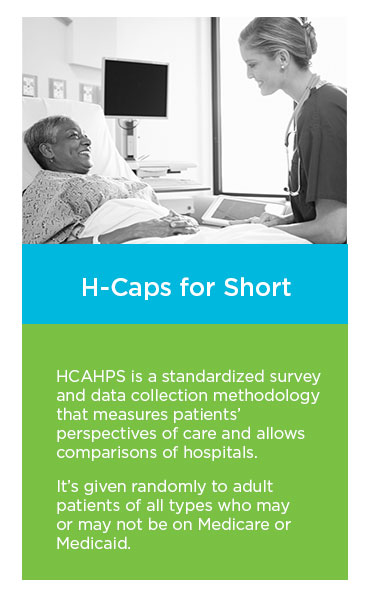Ambassador Software Works, Improving Patient Satisfaction for Hospitals
It’s a common thing these days to be asked to participate in survey about our experience as customers—it happens after we hit the enter key on an e-commerce site, before our cable company connects us to a help desk, or when the wheels have barely touched the ground after a transcontinental airplane flight.
And, if we or a family member has been in the hospital in the last few years, we’ve likely received a patient survey about our experience. 
That survey has a painfully long name (HCAHPS). It’s required by the Centers for Medicare & Medicaid (CMS) and asks discharged patients to rate their experiences in 27 categories of care, including communications with healthcare professionals, pain management, cleanliness, and noise.
CMS uses H-Caps results to determine hospitals’ reimbursement for Medicare and Medicaid services.
Patient satisfaction matters today in ways that it didn’t matter before, that’s where Ambassador Software Works comes in.
In this new era of increased focus on accountability and transparency of pricing, patient outcomes, and patient satisfaction, hospitals have more exposure than “just” losing a portion of the Medicare/Medicaid reimbursement. There’s the added risk of losing future patients.
“Hospital scores are publicly reported—by CMS and by US News & World Report and on multiple hospital ranking sites,” said Tim Newcome, co-founder of Ambassador Software Works, a Columbus startup that provides predictive analytics that anticipate patient needs to help hospitals improve customer satisfaction.
“With higher deductibles, you and I are spending more of our money on hospital bills,” Newcome said. “As potential patients, we’re going to look at a hospital’s patient satisfaction scores to see if we’re going to take our money there or somewhere else.”
He adds, “And from the physicians’ standpoint, if I’m the best cardiologist in town, where do I want to send my patients? Probably not to a hospital that has a low H-Caps score.”
Newcome said that hospital focus on customer acquisition and loyalty has been an eye-opener.
“When my co-founder, Clayton Daley and I started Ambassador, we expected the value proposition for hospitals to be all about the financial payback from Medicare reimbursements,” he said, “but instead hospitals really are more interested in patient satisfaction.”
In hospitals today, working on customer satisfaction is the norm.
“I ask all prospective clients one question,” said Newcome. “Do you feel like your patient satisfaction scores are an indication of how hard your hospital is working to improve patient care? The answer is almost always no.”
Ambassador’s APEX amenity software can help. APEX is based on predictive data and algorithms licensed from The Ohio State University. Ambassador inked licensing agreements with OSU in 2013. Ambassador invested that first year validating the software and then another year ensuring that the software satisfies all privacy requirements and is in full regulatory compliance.
“We’ve really studied this,” Newcome said. “We’ve found out that different patients need different things to feel satisfied. Is it cleanliness, quietness, information about medications, or something as logical as simply being able to get a good night’s sleep?”
But every dollar spent on hospital “amenities” is one less dollar available to reduce the cost of care.
“No hospital can afford to do everything,” Newcome said. “They need help figuring out what will make a difference to patients who are sick and anxious. Our software provides an affordable way to enable a hospital to focus on each patient’s unique needs and concerns.”
For example, APEX often shows that clear discharge instructions and follow-up to see that patients have and are taking medications have a much more significant impact on customer satisfaction than wall color or fresh flowers.
Newcome finds that hospital with already favorable patient satisfaction ratings are most interested in taking meetings and that underperforming hospitals have shown less willingness to explore new ideas.
“Hospitals that are already doing well compared to their peers,” he said, “seem the most interested in improving patient satisfaction even more. One of our beta customers has a top score. That turned our thinking upside down.”

